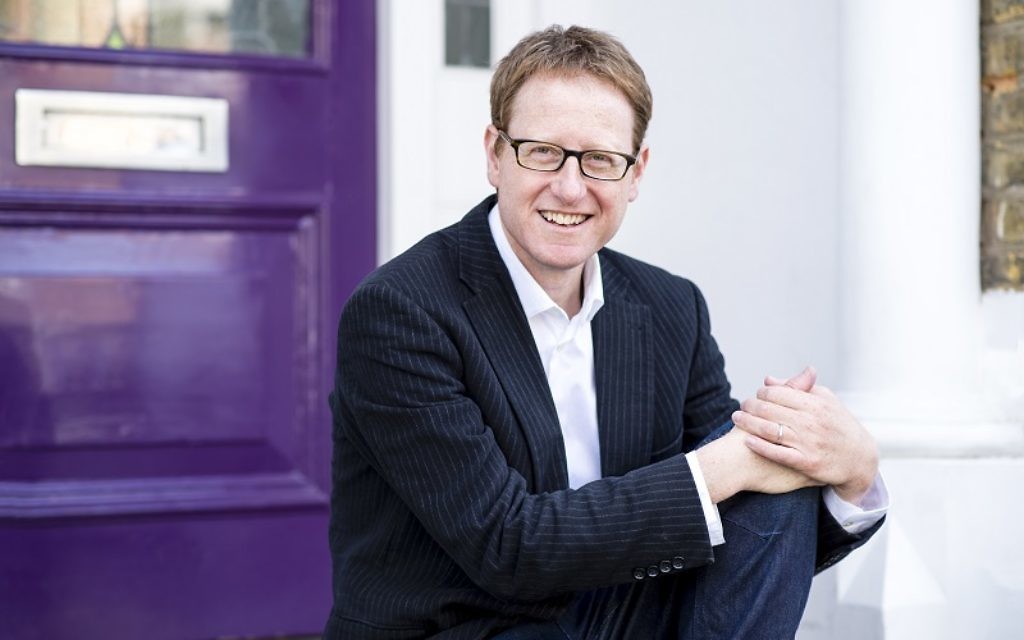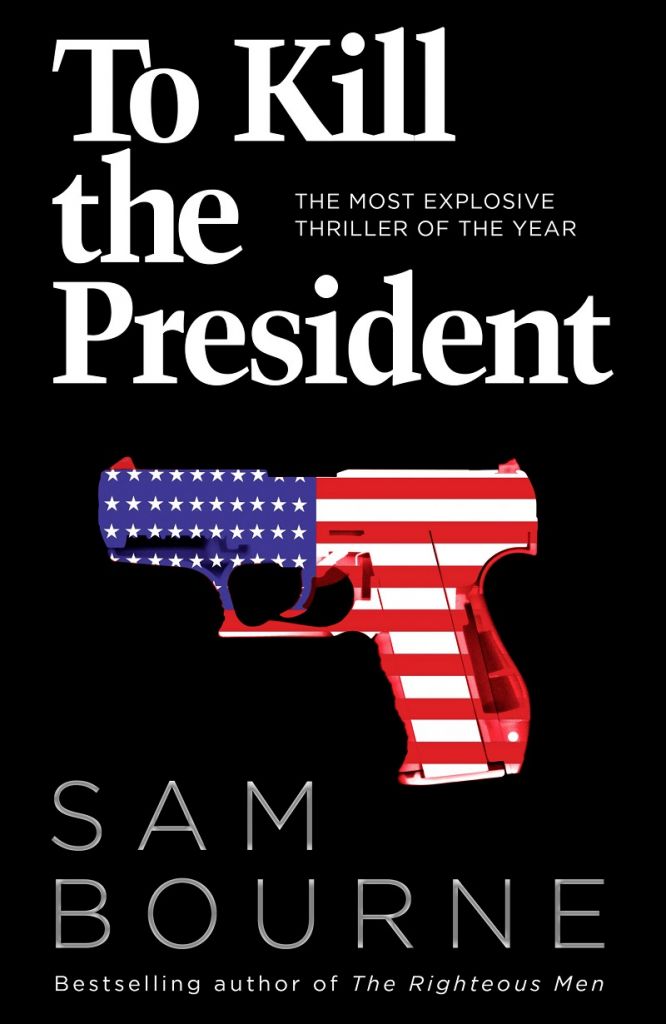Jonathan Freedland: ‘Fiction is harder than journalism – you can’t make things up!’
Francine Wolfisz speaks to the seasoned journalist - aka Sam Bourne - about his latest thriller, To Kill The President
Imagine an America where the volatile president gets so inflamed by a war of words with North Korea, that in a fit of pique he finds himself just seconds away from hitting the nuclear button.
That terrifying – and not entirely improbable – scenario sets the gut-wrenching pace for Sam Bourne’s latest thriller, To Kill The President, which fittingly hits the shelves on 4 July.
At the heart of the edge-of-the-seat drama is Maggie Costello, a seasoned Washington operator, who unwittingly stumbles across a murderous plot against the president, but the weight of her moral dilemma is immense.
Get The Jewish News Daily Edition by email and never miss our top stories Free Sign Up
Should she save the president’s life – but leave the free world at the mercy of a crazed demagogue – or commit the ultimate act of treason against her Commander-in-Chief and risk plunging the country into civil war?
One could argue that the plot sails dangerously close to the winds of current world politics, but any similarities to real life are “solely down to the reader’s imagination”, chuckles journalist Jonathan Freedland, who has been penning thrillers under his Sam Bourne pseudonym (a blend of his younger son’s name and the popular spy series starring Matt Damon) since 2006.
Freedland, who served for four years as the Guardian’s correspondent in Washington, keeps tight-lipped over whether he was inspired by the current president – “I can’t at all control what readers have in their mind” – but admits the first kernel of an idea came to him while covering the 2016 US election campaign.
“Two of the most important words for a thriller writer are: ‘What if?’”, explains the 50-year-old author, who came across an intriguing story concerning American novelist Philip Roth.
“In a book Roth was reading about the Republican Party in 1940, he read that they didn’t have a presidential nominee and there was talk of drafting in Charles Lindbergh, celebrity aviator and a staunch anti-Semite.
“In the margins of the book, Roth wrote, “What if they had?” and from that came his brilliant novel, The Plot Against America, in which he imagines a Nazi sympathiser who becomes the president.
“Similarly, during the course of the Trump-Clinton campaign, I began to think, what if you were a patriot and loyal to your party, but then you came to the conclusion that the leader of your party was actually a danger to America and the world? Where would your duty lie in that situation?”
As he mulled over the idea, the married father-of-two began to research the “trappings of the president”, from the pomp and ceremony of his motorcade, to the public’s obsession with the First Lady and life behind doors at the White House.
But material gains aside, Freedland discovered just how powerful the President actually is.
“He’s actually known as ‘the nuclear monarch’”, gasps Freedland. “In many ways, the president is quite constrained under the American system and even executive orders have to go through the courts. But one of the least restrained powers – and it was deliberately designed this way by Harry Truman – is the nuclear power, where it just goes through nobody.
“People assume if this president wanted to order a nuclear strike, he would have to consult with others.
“But there is no chain of command, there is no process. He just presses the button. I thought that was inherently frightening and dramatic.”
Stories about the nuclear threat, political assassinations, espionage and conspiracy theories have fired the imagination of Freedland ever since he was a youngster.
“Day of the Jackal, The Parallax View, Three Days of the Condor, The Odessa File – I just lapped them all up.”
While he admits to being an avid reader, by day he is more well-known for his career as a journalist. I ask if he prefers the realms of fiction to the pursuit of accuracy and truth.
“Actually, I used to joke that fiction is harder than journalism, because in fiction you can’t make things up,” he quips. “It’s really interesting just how exacting the readers are about accuracy.
“For example, you could be reading Dan Brown’s latest thriller, which will take you on wild flights of fantasy about Jesus, but if you have a character who gets on the Northern Line at Green Park station, the reader will hurl the book across the room and say, ‘I can’t believe a word of this, its complete rubbish!’
“They expect the real world things to be properly researched and accurate.”
“I used to joke that fiction is harder than journalism, because in fiction you can’t make things up”
From poring over government documents detailing nuclear codes and assassination plots to travelling around the world, Freedland draws upon real-life situations and experiences in his writing. That also includes his Jewish heritage.
His first three Sam Bourne books – The Righteous Men, The Last Testament and The Final Reckoning – all revolve around Jewish themes.
Even in this latest outing, Maggie Costello is first prompted to the existence of an assassination plot following the death of the president’s Jewish doctor.
Speaking of Maggie, she is perhaps the one departure from reality that Freedland credits with making his stories all the more believable.
“One of the least strong aspects of my first novel, The Righteous Men, was the central male character, a British-born reporter, who was a bit too similar to me.
“A fast-track way to cure that was to create a woman, because inherently she couldn’t be like me – and readers really responded to her.
“It required an imaginative leap, but that can only be a good thing for a writer to do.”
To Kill The President by Sam Bourne, published by HarperCollins, priced £7.99 (paperback) is out on 4 July

Thank you for helping to make Jewish News the leading source of news and opinion for the UK Jewish community. Today we're asking for your invaluable help to continue putting our community first in everything we do.
For as little as £5 a month you can help sustain the vital work we do in celebrating and standing up for Jewish life in Britain.
Jewish News holds our community together and keeps us connected. Like a synagogue, it’s where people turn to feel part of something bigger. It also proudly shows the rest of Britain the vibrancy and rich culture of modern Jewish life.
You can make a quick and easy one-off or monthly contribution of £5, £10, £20 or any other sum you’re comfortable with.
100% of your donation will help us continue celebrating our community, in all its dynamic diversity...
Engaging
Being a community platform means so much more than producing a newspaper and website. One of our proudest roles is media partnering with our invaluable charities to amplify the outstanding work they do to help us all.
Celebrating
There’s no shortage of oys in the world but Jewish News takes every opportunity to celebrate the joys too, through projects like Night of Heroes, 40 Under 40 and other compelling countdowns that make the community kvell with pride.
Pioneering
In the first collaboration between media outlets from different faiths, Jewish News worked with British Muslim TV and Church Times to produce a list of young activists leading the way on interfaith understanding.
Campaigning
Royal Mail issued a stamp honouring Holocaust hero Sir Nicholas Winton after a Jewish News campaign attracted more than 100,000 backers. Jewish Newsalso produces special editions of the paper highlighting pressing issues including mental health and Holocaust remembrance.
Easy access
In an age when news is readily accessible, Jewish News provides high-quality content free online and offline, removing any financial barriers to connecting people.
Voice of our community to wider society
The Jewish News team regularly appears on TV, radio and on the pages of the national press to comment on stories about the Jewish community. Easy access to the paper on the streets of London also means Jewish News provides an invaluable window into the community for the country at large.
We hope you agree all this is worth preserving.
-
By Brigit Grant
-
By Laurent Vaughan - Senior Associate (Bishop & Sewell Solicitors)
-
By Laurent Vaughan - Senior Associate (Bishop & Sewell Solicitors)
-
By Laurent Vaughan - Senior Associate (Bishop & Sewell Solicitors)
-
By Laurent Vaughan - Senior Associate (Bishop & Sewell Solicitors)























